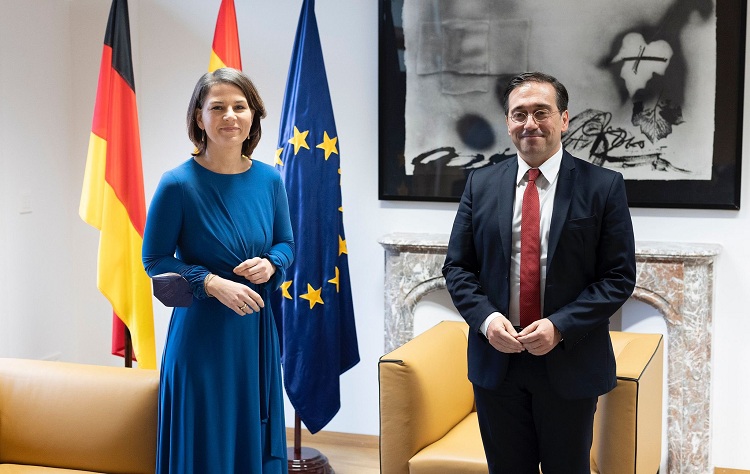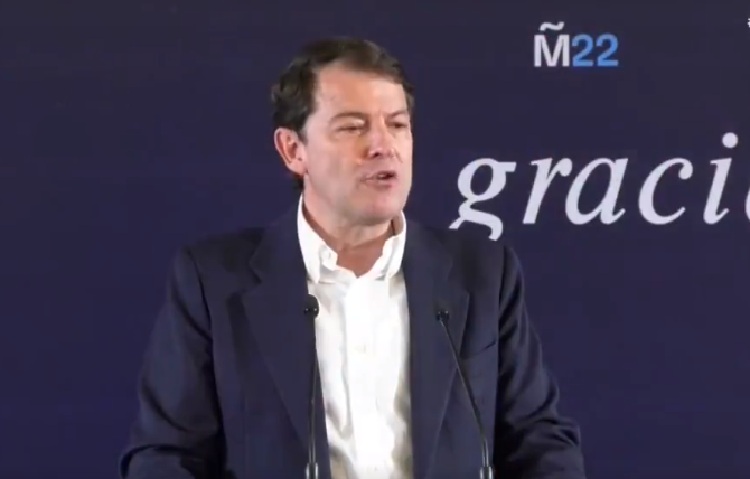Eduardo González
The Minister of Foreign Affairs, José Manuel Albares, will receive tomorrow in Madrid his German counterpart, Annalena Baerbock, a few days before a Security Conference will be held in Munich, clearly marked by the crisis between Russia and Ukraine.
According to the Ministry, Albares will hold tomorrow, Tuesday, a meeting and a lunch with Annalena Baerbock at the ministerial headquarters of the Palacio de Viana, followed by a joint press conference. Earlier today, the Minister will also hold a lunch and press conference with his counterpart from the Netherlands. Wopke Hoekstra.
This is the first visit to Spain of the German minister since her appointment in early December, but not the first meeting between the two, since Albares held a meeting with Baerbock on December 13 in Brussels, in the margins of the EU Foreign Affairs Council. On that occasion, the main topic of conversation was the European energy market and the Spanish proposal in this regard, which does not have the support of Germany. On this occasion, however, the main topic will most probably be the crisis in Ukraine, especially because Germany will host on February 18 and 19 the new edition of the Munich Security Conference, the most important annual event on this subject in the world, which will be attended by the Foreign Minister.
As expected, the conference will be strongly influenced by the crisis in Eastern Europe. The United States has already announced that it will be represented by Vice President Kamala Harris, who will come to Germany to demonstrate Washington’s “steadfast commitment” to NATO allies and its “support for Ukraine’s sovereignty and territorial integrity”, according to the White House, which did not specify which international leaders President Joe Biden’s number two will meet.
On the other hand, Russia will not be attending the conference for the first time in more than twenty years. The forum has been held in the Bavarian capital since 1963 and Moscow has been participating since 1999. According to Kremlin spokesman Dmitry Peskov, President Vladimir Putin has no intention of participating “under any format”. For her part, Foreign Ministry spokeswoman Maria Zakharova declared that this meeting “has been increasingly transformed in recent years into a transatlantic forum” and even denounced that Germany remains an “occupied state” – in reference to the presence of 30,000 US military personnel in the country – and that the United States treats this country “simply as a protectorate”. An example of this, she added, is that Germany “needs Russian gas” but “the US won’t let it buy it”.
Annalena Baerbock has recently joined the “high-intensity diplomacy” deployed by the international community to calm the waters. On February 7, the German minister visited Ukraine to meet with her counterpart, Dmytro Kuleba, to whom she reiterated, “as a partner country of Ukraine, the EU, NATO and the G7”, her support “without buts for the territorial integrity of the country” and her shared commitment to “respond to any new Russian aggression against Ukraine with tough and very concrete measures”. Albares himself was last Wednesday in Kiev, where he reaffirmed Spain’s support for “the sovereignty and territorial integrity of Ukraine”, assured that the Government of Pedro Sanchez is willing to work in a coordinated manner within the EU to apply new deterrent measures to Russia and avoided any reference to the possible sending of Spanish weapons to Ukraine because “this is the time for diplomacy and not to open scenarios and hypotheses that are not there”.
Another possible topic at the meeting between Albares and Baerbock is the situation in Mali, after France threatened to withdraw its 5,000 troops from the country in retaliation for the expulsion of its ambassador in Bamako. Annalena Baerbock herself has announced that Germany could reconsider the permanence of its more than 300 troops in the European Union Training Mission in Mali (EUTM Mali) and of its almost 1,000 soldiers in the UN mission (MINUSMA). Spain currently provides the largest contingent (500 soldiers, 24% of the total) to EUTM Mali. On 8 February last, Albares declared to the press that “the decisions we have to take in this respect will be taken by all Europeans together because that is how the decision was taken to go to Mali together”.







